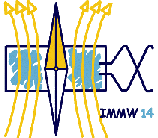Speaker
Mr
Alessandro Masi
(CERN)
Description
Decay and snapback measurements for the b3 and b5 field harmonics are very
important
to model the magnet’s behaviour during beam injection and initial acceleration of
the particles. Snapback occurs very quickly and the rotating coils are not fast
enough to provide enough data and hence enable proper modeling of the phenomenon.
Therefore to resolve the snapback evolution in time better, a hall probe sensor
with
a high acquisition frequency was developed. Here we present the hardware and the
software of the new data acquisition system developed for this probe. The goal
reached was the realization of a complete instrument for b3-b5 measurements
characterized by a user friendly interface in the acquisition process particularly
designed for operators. All possible instrument faults are detected and displayed
in
real time. After the measurements, a step-by-step calibration procedure is
implemented. Hence the instrument provides the parameters of the decay and snapback
waveforms acquired which are indispensable for the phenomena modeling.
Summary
Plan of presentation
What is decay and snapback?
Principle of operation
Hardware calibration
Sensor characterization
Compensation cards characterization
Hall plates linearity evaluation
The New data acquisition system: hardware overview
System resolution
The software overview
Shift calibration
Analysis calibration
The correlation and the snapback law
Fast b3 effects
Digital bucking
The new PXI system
Author
Mr
Alessandro Masi
(CERN)
Co-authors
Mr
Gabriele Greco
(University of Naples)
Dr
Luca Bottura
(CERN)
Mr
Nicholas Sammut
(CERN, University of Malta)
